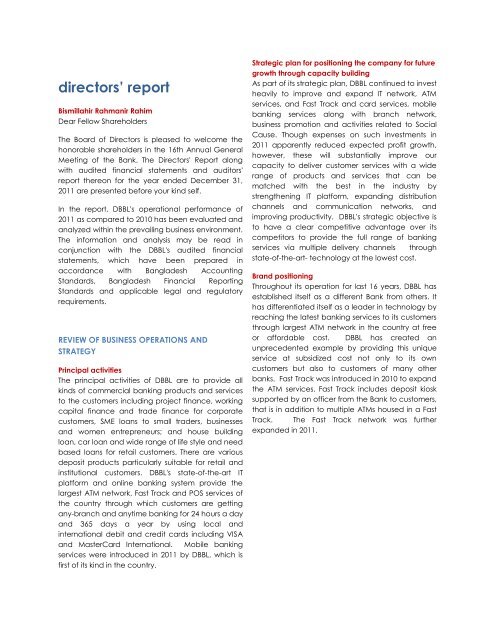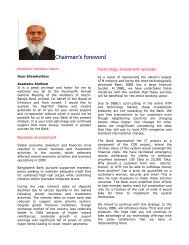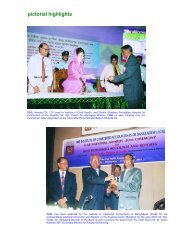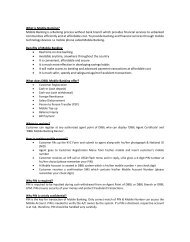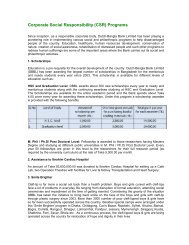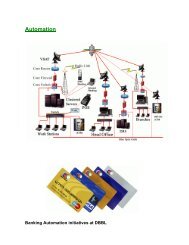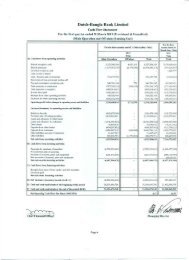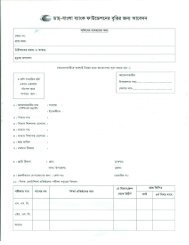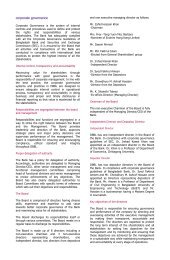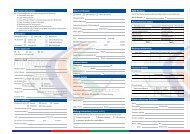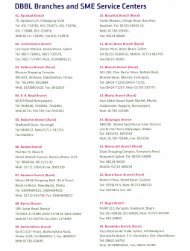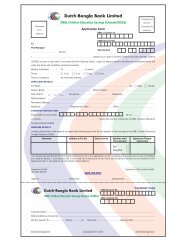directors' report - Dutch-Bangla Bank Limited
directors' report - Dutch-Bangla Bank Limited
directors' report - Dutch-Bangla Bank Limited
You also want an ePaper? Increase the reach of your titles
YUMPU automatically turns print PDFs into web optimized ePapers that Google loves.
directors’ <strong>report</strong><br />
Bismillahir Rahmanir Rahim<br />
Dear Fellow Shareholders<br />
The Board of Directors is pleased to welcome the<br />
honorable shareholders in the 16th Annual General<br />
Meeting of the <strong>Bank</strong>. The Directors' Report along<br />
with audited financial statements and auditors'<br />
<strong>report</strong> thereon for the year ended December 31,<br />
2011 are presented before your kind self.<br />
In the <strong>report</strong>, DBBL's operational performance of<br />
2011 as compared to 2010 has been evaluated and<br />
analyzed within the prevailing business environment.<br />
The information and analysis may be read in<br />
conjunction with the DBBL's audited financial<br />
statements, which have been prepared in<br />
accordance with <strong>Bangla</strong>desh Accounting<br />
Standards, <strong>Bangla</strong>desh Financial Reporting<br />
Standards and applicable legal and regulatory<br />
requirements.<br />
REVIEW OF BUSINESS OPERATIONS AND<br />
STRATEGY<br />
Principal activities<br />
The principal activities of DBBL are to provide all<br />
kinds of commercial banking products and services<br />
to the customers including project finance, working<br />
capital finance and trade finance for corporate<br />
customers, SME loans to small traders, businesses<br />
and women entrepreneurs; and house building<br />
loan, car loan and wide range of life style and need<br />
based loans for retail customers. There are various<br />
deposit products particularly suitable for retail and<br />
institutional customers. DBBL's state-of-the-art IT<br />
platform and online banking system provide the<br />
largest ATM network, Fast Track and POS services of<br />
the country through which customers are getting<br />
any-branch and anytime banking for 24 hours a day<br />
and 365 days a year by using local and<br />
international debit and credit cards including VISA<br />
and MasterCard International. Mobile banking<br />
services were introduced in 2011 by DBBL, which is<br />
first of its kind in the country.<br />
Strategic plan for positioning the company for future<br />
growth through capacity building<br />
As part of its strategic plan, DBBL continued to invest<br />
heavily to improve and expand IT network, ATM<br />
services, and Fast Track and card services, mobile<br />
banking services along with branch network,<br />
business promotion and activities related to Social<br />
Cause. Though expenses on such investments in<br />
2011 apparently reduced expected profit growth,<br />
however, these will substantially improve our<br />
capacity to deliver customer services with a wide<br />
range of products and services that can be<br />
matched with the best in the industry by<br />
strengthening IT platform, expanding distribution<br />
channels and communication networks, and<br />
improving productivity. DBBL's strategic objective is<br />
to have a clear competitive advantage over its<br />
competitors to provide the full range of banking<br />
services via multiple delivery channels through<br />
state-of-the-art- technology at the lowest cost.<br />
Brand positioning<br />
Throughout its operation for last 16 years, DBBL has<br />
established itself as a different <strong>Bank</strong> from others. It<br />
has differentiated itself as a leader in technology by<br />
reaching the latest banking services to its customers<br />
through largest ATM network in the country at free<br />
or affordable cost. DBBL has created an<br />
unprecedented example by providing this unique<br />
service at subsidized cost not only to its own<br />
customers but also to customers of many other<br />
banks. Fast Track was introduced in 2010 to expand<br />
the ATM services. Fast Track includes deposit kiosk<br />
supported by an officer from the <strong>Bank</strong> to customers,<br />
that is in addition to multiple ATMs housed in a Fast<br />
Track. The Fast Track network was further<br />
expanded in 2011.
DBBL has also established itself as a <strong>Bank</strong> that cares<br />
for the society. All the business activities of DBBL are<br />
done in full conformity with social, ethical and<br />
environmental standards. DBBL is the pioneer in<br />
Social Cause programs in the country. It has been<br />
intensifying its resources and efforts on a continuous<br />
basis to reach the distressed & needy people of the<br />
society to bring smile on their face and to improve<br />
their health and educational standard and overall<br />
quality of life.<br />
DBBL unfolded a massive and expanded<br />
scholarship program in 2011 which will provide<br />
yearly scholarships worth Taka 1,020 million to 30,000<br />
students studying in HSC and graduation levels.<br />
Customer focus and customers' right<br />
DBBL's performance can not be judged by just<br />
looking at profit figures. DBBL considers that it is the<br />
customers' right to get modern, online and full<br />
ranges of banking services at an affordable price<br />
anytime and anywhere. DBBL's service cost is the<br />
lowest in the industry and in many cases services<br />
provided through ATM and Fast Track are free. DBBL<br />
is committed to put the customers’ interest first. In<br />
line with its central vision, DBBL is promise-bound to<br />
extend personalized services to the full satisfaction<br />
of the customers that should be considered by the<br />
customers to be the best in the industry.<br />
Corporate governance ensuring best practices<br />
DBBL complies with good corporate governance<br />
practices in line with industry best practices and<br />
regulatory requirements ensuring transparency,<br />
accountability and fairness at every step of its<br />
business operations to maximize performance with<br />
governance. Corporate governance practices in<br />
DBBL are set out on pages 37 to 49 of this Annual<br />
Report.<br />
Managing risks ensuring quality and value of assets<br />
and uninterrupted operations<br />
Risk management covering credit risks, operational<br />
risks, market risks and other risks is at the heart of all<br />
business operations and transactions of DBBL. Risk<br />
management systems are designed and<br />
implemented to maintain and improve quality and<br />
value of assets, and smooth banking operations<br />
and services in a sustainable way to protect interest<br />
of shareholders, depositors and all the stakeholders.<br />
Risk management system also complies with<br />
<strong>Bangla</strong>desh <strong>Bank</strong>’s core risk management<br />
guidelines as well as capital adequacy ratio as per<br />
Basel II.
SME Financing<br />
Small and Medium Enterprises (SMEs) are major<br />
contributors to GDP and employment in many<br />
countries of the world. They play a major role for the<br />
economic and social development by creating jobs<br />
and generating income for low-income people;<br />
they foster economic growth, social stability, and<br />
contribute to the development of a dynamic<br />
private sector. In <strong>Bangla</strong>desh, they also play a<br />
major role in economic and social development by<br />
creating jobs and generating higher earnings for<br />
low and middle-income people. In order to step up<br />
SME banking services, the <strong>Bank</strong> set up a dedicated<br />
SME Division in 2009.<br />
<strong>Dutch</strong>-<strong>Bangla</strong> <strong>Bank</strong> has been striving to open up<br />
new windows for financing SMEs. Women constitute<br />
50% of the total population of our country. Ignoring<br />
these huge masses true development can not be<br />
achieved. During 2011, DBBL has introduced a<br />
product specifically aimed at women entrepreneurs<br />
for changing the fortunes and empowering<br />
potential women entrepreneurs. Now women<br />
entrepreneurs can avail hassle free SME loans from<br />
DBBL for doing their own business.<br />
During the year 2011, DBBL attained steady growth<br />
in SME lending in spite of many constraints. DBBL<br />
already disbursed Taka 30,867.9 million in SME<br />
sectors. Outstanding SME loans stood at Taka<br />
19,815.7 million at the end of 2011 reflecting a<br />
growth of 5.0% over the previous year. We have a<br />
target to disburse Taka 960.0 million in SME sectors in<br />
2012.<br />
During the year under review, the <strong>Bank</strong><br />
participated in Agro-Based Industry, SME Finance &<br />
Entrepreneurs Fair in Rangpur, Adibasi Nari<br />
(Indigenous Women) Entrepreneurs Assembly in<br />
Komolganj, Moulvi Bazar; Agro-based Light<br />
Engineering Industry Fair in Bogra; <strong>Bank</strong>ers-<br />
Entrepreneurs Assembly in Gopalganj; SME Saikat<br />
Utshab in Cox's Bazar arranged by <strong>Bangla</strong>desh <strong>Bank</strong><br />
and SME Foundation. The <strong>Bank</strong> also took part in the<br />
5th FBCCI SME Fair-2011 arranged by FBCCI. In these<br />
events, the <strong>Bank</strong> got the opportunity for two-way<br />
communications with existing and potential<br />
entrepreneurs. The products and services of the<br />
<strong>Bank</strong> were highlighted and many new<br />
entrepreneurs could be attracted to avail SME loans<br />
from DBBL.<br />
In future, the <strong>Bank</strong> will continue to focus more on<br />
the SME Financing for customers in rural areas as<br />
well as semi-urban areas with tailor-made products<br />
and services backed by our robust IT infrastructure.<br />
Personal <strong>Bank</strong>ing<br />
Personal banking is generally refers to offering<br />
financial services, products related to deposits and<br />
assets to individual customers for personal<br />
consumption which provide a wide range of<br />
banking services, including offering savings bank<br />
deposits, recurring deposit, salary accounts, bill<br />
paying services, personal loans as well as debit and<br />
credit cards.<br />
In our fiercely competitive financial market, in<br />
addition to wide ranges of products and services<br />
tailored for specific customer segments, faster and<br />
high quality services are essential prerequisites for<br />
having competitive edge over other banks and<br />
other financial institutions. Accordingly, our “Retail<br />
<strong>Bank</strong>ing Division” has been restructured as “Personal<br />
<strong>Bank</strong>ing Division” for ensuring segmented sales &<br />
services for individual customers through centralized<br />
support and coordination.<br />
Key features of Personal <strong>Bank</strong>ing Division:<br />
Wide range of retail banking products. i.e.<br />
personal loan, auto loan, home loan,<br />
deposit scheme etc.;<br />
1st EMV/Chip based Credit Card facility;<br />
Good number of branches across the<br />
country;<br />
Strong alternative distribution channels i.e.<br />
ATM, Fast Track, Internet <strong>Bank</strong>ing, POS, e-<br />
Commerce etc.;<br />
Strong brand identity in the market.<br />
In addition to normal savings deposit accounts,<br />
Personal <strong>Bank</strong>ing Division (PBD) has been also<br />
offering Power account, Power Line & Power plus<br />
Line proposition to its salaried account holders.<br />
Total savings deposit of the <strong>Bank</strong> stood at<br />
Taka.37,503.6 million at the end of 2011.<br />
As of 31 December 2011, number of DBBL Retail<br />
Loan customers stood at 9,845 and total<br />
disbursement amount stood at Taka 3,046 Million.<br />
Outstanding retail & consumer loan stood at Taka<br />
1,604.9 million.
Newly restructured, Personal <strong>Bank</strong>ing Division has<br />
taken following strategies to achieve long-term<br />
sustainable growth:<br />
Providing best possible services through<br />
expansionary distribution channels;<br />
Introduction of loyalty program for<br />
customers;<br />
Developing faster communication process;<br />
Introducing new products and services<br />
according to customer needs;<br />
Competitive pricing.<br />
DBBL’s personal banking division is equipped with<br />
adequate manpower, strong IT and ATM networks.<br />
Various promotional activities supported by<br />
competitive pricing will be undertaken to gain<br />
market share in 2012.<br />
Expansion of branches<br />
The <strong>Bank</strong> opened 15 new branches in 2011 to reach<br />
111 branches at the end of the year spreading the<br />
branch network throughout the country. More<br />
branches will be opened in 2012 to expand the<br />
branch and distribution network. These will bring upto-date<br />
banking services to our existing and<br />
potential customers. At the same time it will optimize<br />
utilization of our strong delivery channels, increase<br />
our resource position and business potentials that<br />
will maximize profitability and shareholders' value.<br />
DBBL's strategy is to reach the doorsteps of<br />
customers to provide full range of banking services<br />
based on state- of -the- art- technology and IT<br />
platform at free or affordable cost.<br />
Correspondent banking relationship<br />
In order to facilitate international transactions<br />
including trade facilitations and remittance services,<br />
DBBL is having correspondent relationship and<br />
agency arrangements with internationally reputable<br />
major banks and other financial institutions<br />
throughout the world. DBBL arranges credit lines<br />
and other facilities for 16 Authorized Dealer (AD)<br />
branches and two off-shore banking unit of the<br />
<strong>Bank</strong>. As on December 31, 2011, the number of<br />
correspondent banks stood at 553 covering 96<br />
countries. For settlement of Trade Finance and all<br />
other customer driven transactions denominated in<br />
foreign currency, the <strong>Bank</strong> maintains 22 nostro<br />
accounts in 8 major international currencies with<br />
renowned international banks in all the major<br />
financial centers around the world. The <strong>Bank</strong> enjoys<br />
sufficient credit lines from correspondent banks for<br />
adding confirmation to letters of credit as and when<br />
needed, which is facilitating international trade<br />
finance. In 2011, DBBL arranged add confirmation<br />
for USD 162.8 million through correspondent banks<br />
for facilitating trade service. DBBL is also having<br />
‘Issuing <strong>Bank</strong> Agreement’ with ADB under their<br />
Trade Finance Facilitation Program. This program<br />
supports a wide range of transactions, from<br />
commodities and capital goods as well as<br />
consumer goods.<br />
Non Resident <strong>Bangla</strong>deshi (NRB) workers’<br />
remittance becomes one of the major sources of<br />
foreign exchange. DBBL has remittance agreement<br />
with 16 exchange houses all over the world. DBBL<br />
has already earned the confidence and trust of<br />
wage earners. DBBL is efficiently managing a<br />
sizeable volume of remittances, which is steadily<br />
growing every year. DBBL is relentlessly working to<br />
ease the flow of inbound foreign remittances. For<br />
this reason, the <strong>Bank</strong> introduced state –of- the- art<br />
technology, mobile banking services, and alternate<br />
delivery channel to cater to the growing needs of<br />
customers at home and abroad.<br />
Remittance inflow of DBBL rose significantly by 35.4<br />
percent from USD 105.8 million in 2010 to USD 143.3<br />
million in 2011.<br />
Progressive, healthy and safe working environment<br />
for staff<br />
A high quality and competent human resource is<br />
crucial to continued growth and success of any<br />
business entity which can be achieved by<br />
improving skill, knowledge and productivity of<br />
employees. Accordingly, how human resource is<br />
recruited, trained, developed & motivated has far<br />
reaching implication on long-term sustainable<br />
growth of the <strong>Bank</strong>. Customers’ perception &<br />
satisfaction ultimately determines relative or<br />
absolute success or failure of an organization. In<br />
turn, we need a competent, well-trained,<br />
committed & motivated team of human resources<br />
with positive & sincere attitude towards customers<br />
that can develop, maintain and strengthen trust &<br />
confidence in our customers that is crucial for our<br />
success.<br />
A talented, committed, skilled and fully motivated<br />
team of human resources is the main driving force<br />
for providing better, faster and coordinated services
to the clients and for performing at the highest level<br />
in a fiercely competitive financial market like<br />
<strong>Bangla</strong>desh. Accordingly, the <strong>Bank</strong>'s strategy is to<br />
attract, retain and motivate the most talented<br />
people and providing them with healthy, safe and<br />
progressive working environment and competitive<br />
compensation package.<br />
HR policies are designed to long-term career growth<br />
- unleashing the hidden potential<br />
The <strong>Bank</strong>'s HR policies are based on trust and<br />
relationship. The <strong>Bank</strong>'s policy is to look after people<br />
who want to make a long-term career with the<br />
<strong>Bank</strong> because trust and relationship are built over<br />
time. Remuneration package may be an important<br />
factor to motivate for joining a company, but it is<br />
not the only one. The corporate culture at DBBL as<br />
grew over last 16 years is such that the members of<br />
the staff have ample opportunities to take initiative<br />
and responsibilities to unleash their hidden potential<br />
to maximize benefits for themselves and for the<br />
society. The challenge is to maintain a business like,<br />
committed corporate culture that matches DBBL's<br />
mission. Achieving results and taking responsibility<br />
are important components of the culture we<br />
pursue, one in which management and staff work<br />
together and are mutually accountable.<br />
DBBL provides challenging but rewarding career<br />
where good values, fairness and hard work are<br />
highly encouraged<br />
In case of DBBL, it is excellence of DBBL with good<br />
values, fairness, potential for success, scope to<br />
develop a broad interesting career etc. which<br />
attract people to join and work with DBBL. DBBL<br />
always encourages excellence in performance by<br />
rewards and recognition.<br />
Healthcare, safety standards and modern working<br />
environment<br />
A thorough medical checkup facility is<br />
provided to each employee in every<br />
alternate year;<br />
Medical allowance @ 10% of basic salary is<br />
paid to each employee which is tax-free;<br />
In order to provide highly sophisticated and<br />
encouraging working environment, all the<br />
DBBL offices including head office and<br />
branches are equipped with modern<br />
facilities with air-conditioning and generator<br />
for power back up;<br />
All DBBL offices including head office and<br />
branches are equipped with fire fighting<br />
material and have multiple exit points for<br />
emergency exit.<br />
Staff welfare schemes in DBBL<br />
A number of well thought out policies are in place<br />
for welfare of employees in DBBL those are in<br />
addition to competitive compensation package<br />
available in the industry:<br />
• DBBL Provident Fund,<br />
• DBBL Superannuation Fund,<br />
• DBBL Gratuity Fund,<br />
• House Building Loan Scheme,<br />
• Car Loan Scheme,<br />
• Festival bonus,<br />
• Incentive bonus, and<br />
• Study leave.<br />
Career development and training program<br />
DBBL attaches utmost importance to the<br />
development of its employees through continuous<br />
training so that DBBL executives can have<br />
competitive advantage in the market. The training<br />
need of individual employees including training<br />
need for introducing new products, services and<br />
technology is evaluated on a continuous and<br />
systematic way. DBBL executives are encouraged<br />
to attend high quality training at home and abroad<br />
to develop and broaden existing knowledge and<br />
skills and to acquire new skills and expertise.<br />
We imparted training to 1,830 officers in 25 different<br />
courses during 2011. The training programs were<br />
organized by our own training institute. We also<br />
nominated 149 officers to undergo 61 different<br />
training programs/courses organized by different<br />
organizations like <strong>Bangla</strong>desh Institute of <strong>Bank</strong><br />
Management (BIBM), <strong>Bangla</strong>desh <strong>Bank</strong> Training<br />
Academy (BBTA) and other similar organizations. In<br />
addition, fourteen executives/officers were sent<br />
abroad for attending overseas training and<br />
workshop.
The number of DBBL staff increased by 1,221 in 2011.<br />
At the end of 2011, number of staff stood at 4,015<br />
compared to 2,794 at the end of 2010.<br />
CONTRIBUTION TO NATIONAL ECONOMY &<br />
NATIONAL EXCHEQUER<br />
Contribution to national economy<br />
Primarily our business strategies are based on<br />
goodwill and trust of the customers and other<br />
stakeholders. Our Social Cause programs help<br />
strengthens this trust. DBBL conducts its activities in a<br />
responsible way to maximize value for its customers,<br />
stakeholders and the economy.<br />
Making technology affordable for masses to<br />
facilitate seamless transaction and socio-economic<br />
development<br />
In DBBL, banking products and services based on<br />
latest technology and multiple delivery channels<br />
are aimed at faster and better customer services at<br />
the doorsteps of customers at affordable cost. DBBL<br />
being the most technologically advanced <strong>Bank</strong> has<br />
established the largest ATM and Fast Track network<br />
of the country with a huge investment which is not<br />
at all financially rewarding. Still DBBL has taken these<br />
initiatives as part of its Social Cause programs to<br />
reach the benefits to the customers enabling them<br />
to make seamless transaction 24 hours a day across<br />
the country. At the end of 2011, such services were<br />
provided through 111 branches, 1,940 ATMs, 153<br />
Fast Tracks and a large number of POS terminals<br />
spread throughout the country.<br />
To widen and spread the benefit of the ATM and<br />
Fast Track network, DBBL is allowing customers of<br />
other banks to use the Network at nominal cost.<br />
DBBL is committed to spread the network even<br />
further to maximize socio-economic benefits of the<br />
country though it is not cost-effective for the <strong>Bank</strong>.<br />
By providing such services, DBBL is enabling the<br />
customers to maximize their business potentials and<br />
to fulfill their personal hopes and aspirations.<br />
In addition, mobile banking services were<br />
introduced in 2011 by DBBL which is first of its kind in<br />
the country to provide banking services to mainly<br />
those people who are living in rural areas of the<br />
country and mostly deprived of conventional<br />
banking services.<br />
Mobilization and allocation of resources in optimum<br />
way-extending loans to important sectors at<br />
reasonable interest rate and charges<br />
It is the policy of DBBL to mobilize resources from<br />
diversified sources to make it cost effective and<br />
sustainable to support business growth. Depositors<br />
are offered the best technology driven products &<br />
services available in the market to encourage them<br />
in savings. While resources are allocated at<br />
competitive rates preferably in most productive as<br />
well as export-oriented sectors to maximize<br />
economic and social development of the country.<br />
Resources are also allocated to farmers, people<br />
engaged in small business and trade and other<br />
individuals to make them self reliant so that they<br />
can fulfill their hopes and aspirations and lead a<br />
meaningful life and contribute to social progress.<br />
Credit-deposit ratio is contained within optimum<br />
limits to ensure utilization of resources within<br />
tolerable risks.<br />
In 2011 total liability, including capital, deposit,<br />
borrowing and others increased from Taka 101,182<br />
million to Taka 123,267 million. Number of deposit<br />
accounts increased from 1,352,870 to 2,026,189.<br />
Loans and advances increased from Taka 67,658<br />
million to Taka 79,661 million. Within loans, Taka<br />
19,816 million was given to SME, Taka 1,605 million<br />
was given as retail & consumer loans and Taka<br />
1,299 million was given to Agriculture sector.<br />
Commitment to rural area and Supporting SME<br />
DBBL has seven SME/Agriculture branch and three<br />
SME service centers mainly in rural areas to support<br />
SMEs and to bring related low income group under<br />
financial intermediation to help them become self<br />
reliant and unleash the potential of economic<br />
growth in rural area. The centers also facilitate quick<br />
transfer of funds from home and abroad to rural<br />
people through ATMs and mobile banking services.<br />
In order to reinforce our commitment to rural and<br />
marginal people of the country, mobile banking<br />
services were introduced in 2011 by DBBL, which is<br />
first of its kind in the country, to provide banking<br />
services to mainly those people who are living in<br />
rural areas of the country and mostly deprived of<br />
conventional banking services.<br />
Contribution to the national exchequer<br />
DBBL made significant contribution to the<br />
government in boosting its revenue collection. As
per the prevailing law of the country, the <strong>Bank</strong><br />
being a corporate citizen pays tax and VAT on its<br />
own income. Besides, the <strong>Bank</strong> deducts income tax,<br />
VAT and excise duty at source from clients,<br />
depositors and suppliers, and deposits the same to<br />
the national exchequer.<br />
During the year 2011, the <strong>Bank</strong> contributed Taka<br />
3,154.6 million to national exchequer as against<br />
Taka 2,353.0 million in the previous year.<br />
Social Cause (Corporate Social Responsibility) -<br />
Supporting the society at large<br />
DBBL being a responsible corporate citizen of the<br />
country has been playing a pioneering role in<br />
implementing various social and philanthropic<br />
programs to help disadvantaged people of the<br />
country. Education, healthcare, human resource<br />
development, conservation of nature, creation of<br />
social awareness, rehabilitation of distress<br />
humanities and such other programs to redress<br />
human sufferings are some of the important areas<br />
where the <strong>Bank</strong> carries out its social and<br />
philanthropic activities.<br />
In order to discharge activities related to Social<br />
Cause Programs in effective way DBBL established<br />
the <strong>Dutch</strong>-<strong>Bangla</strong> <strong>Bank</strong> Foundation (DBBF) in 2001 in<br />
which contribution is made by the <strong>Bank</strong> to carry out<br />
its Social Cause programs. In addition, <strong>Bank</strong> also<br />
makes direct contribution towards highly important<br />
Social Cause programs in the area of education,<br />
healthcare etc. DBBL’s contribution to Social cause<br />
programs was Taka 270.6 million in 2011 compared<br />
to Taka 107.5 million in 2010.<br />
DBBL unfolded a massive and expanded<br />
scholarship program in 2011 which will provide<br />
yearly scholarships worth Taka 1,020 million to 30,000<br />
students studying in HSC and graduation levels.<br />
DBBL is committed to eco-friendly business<br />
environment<br />
DBBL complies with environmental standard while<br />
financing industrial projects. Projects with likely<br />
adverse impact on environment are strongly<br />
discouraged by DBBL. We are trying to incorporate<br />
sound environmental management process in<br />
business operations of projects financed by us that<br />
can ensure healthy and sustainable lives for our<br />
future generations. DBBL earlier introduced a<br />
guideline demanding assessment of environmental<br />
and social impacts of the projects to ensure that<br />
operations of the projects would be eco-friendly.<br />
DBBL is sponsoring social awareness programs for<br />
protecting the environment<br />
Environmental degradation and depletion of<br />
natural resources are matters of great concern in<br />
<strong>Bangla</strong>desh like anywhere in the world.<br />
Environmental degradation is taking place due to<br />
poverty, over population and lack of awareness<br />
about the environment. It is manifested by<br />
deforestation, destruction of wetlands, depletion of<br />
soil nutrients etc. Natural calamities like floods,<br />
cyclones and tidal bores also result in severe socioeconomic<br />
and environmental damage. DBBL has<br />
been continuously creating social awareness to<br />
protect the environment that is essential for present<br />
and future generations. With that end in view, DBBL<br />
is regularly advertising in print and electronic media<br />
to develop an eco-friendly society for sustainable<br />
and healthy human life.
DBBL has adopted Green <strong>Bank</strong>ing guidelines of<br />
<strong>Bangla</strong>desh <strong>Bank</strong><br />
DBBL has already adopted Green <strong>Bank</strong>ing<br />
guidelines of <strong>Bangla</strong>desh <strong>Bank</strong>. Accordingly, a<br />
Green <strong>Bank</strong>ing policy of its own, in line with BB’s<br />
Green <strong>Bank</strong>ing policy, has already been approved<br />
by the Board of Directors of the <strong>Bank</strong>. The <strong>Bank</strong> is<br />
taking all possible measures to implement the policy<br />
while extending credit facilities to clients and to<br />
implement in its own offices to promote an ecofriendly<br />
environmental policy for sustainable<br />
development of the country while protecting the<br />
environment for our future generations.<br />
REVIEW OF PERFORMANCE AND FINANCIAL<br />
POSITION OF THE BANK<br />
Summary<br />
Healthy business and profit growth<br />
DBBL registered healthy business and profit growth in<br />
2011 while being cautious to protect against<br />
liquidity, interest rate, foreign exchange and credit<br />
risk while conducting business operations during the<br />
year 2011 that was generally characterized by<br />
increasing liquidity pressure in money market and,<br />
foreign exchange market, higher interest rate,<br />
depreciating Taka against major currencies and<br />
generally adverse business conditions.<br />
The deposit of the <strong>Bank</strong> increased by 21.0 % from<br />
Taka 83,244.8 million in 2010 to Taka 100,711.0 million<br />
in 2011, loans and advances increased by 17.7%<br />
from Taka 67,657.7 million to Taka 79,660.7 million in<br />
2011 while export business increased by 25.7% and<br />
import business decreased by 4.8%. Operating profit<br />
grew by 13.8% from Taka 4,198.5 million to Taka<br />
4,779.9 million and net profit after tax increased<br />
from Taka 2,002.3 million to Taka 2,154.9 million<br />
showing a growth of 7.6%. Despite higher operating<br />
cost, higher net interest income resulting from<br />
improved deposit mix and higher non-interest<br />
income resulting from more value added services<br />
contributed to notable growth in operating profit.<br />
Net profit after tax grew at a lower rate than<br />
operating profit mainly due to higher provisioning for<br />
income tax though loan loss provision was lower for,<br />
better credit risk management and maintaining<br />
quality of assets. Return on equity was 27.0% in 2011<br />
compared to 35.3% in 2010.<br />
Higher investments in branch expansion, IT platform,<br />
Fast Track and ATM network, card services and<br />
human resources along with newly introduced<br />
mobile banking services though contained profit<br />
growth in 2011 however, these will increase resource<br />
capacity, increase distribution network, improve<br />
efficiency in operations, augment resource flow to<br />
expand customer base and ensure much better<br />
and faster customer services. As a result, in the long<br />
term it will bring substantial and sustainable benefits<br />
for the <strong>Bank</strong>.<br />
Net interest income<br />
During the year 2011, the net interest income of the<br />
<strong>Bank</strong> rose by Taka 1,233.2 million or 33.1% to Taka<br />
4,960.0 million from Taka 3,726.8 million of the<br />
previous year. Net interest income increased mainly<br />
due to improved deposit mix, higher average loan<br />
portfolio, higher yield on loans and advances and<br />
higher yield on money market placements. Cost of<br />
fund including operating cost increased to 9.9% in<br />
2011 from 8.2% in 2010 while yield on loans and<br />
advances rose to 13.0% in 2011 from 11.5% in 2010<br />
mainly due to sustained higher interest rate<br />
prevailing in the market resulting from mounting<br />
liquidity pressure originating from tight monetary<br />
policy continued by <strong>Bangla</strong>desh <strong>Bank</strong> and market<br />
competition. The share of net interest income to the<br />
total income of the <strong>Bank</strong> increased to 54.6% in 2011<br />
compared to 52.1% of the previous year.<br />
Investment income<br />
During the year 2011, the investment income of the<br />
<strong>Bank</strong> declined by Taka 109.4 million (-8.6%) to Taka<br />
1,169.4 million from Taka 1,278.8 million of the<br />
previous year. Investment income decreased<br />
mainly due to lower investment by the <strong>Bank</strong> in 2011.<br />
Non-interest income<br />
The non-interest income consists of the commission,<br />
exchange and other operating income of the <strong>Bank</strong>.<br />
Total non-interest income of DBBL increased by Taka<br />
698.2 million or 20.3% in 2011 over the previous year.<br />
Commission and exchange income increased by<br />
Taka 540.0 million or 47.3% during the year 2011.<br />
Other operating income grew by Taka 267.7 million<br />
(26.5%) from Taka 1,010.9 million in 2010 to Taka<br />
1,278.6 million in 2011. Other operating income<br />
increased due to growing value added services<br />
provided through multiple delivery channels<br />
powered by state-of-the-art IT network of the <strong>Bank</strong>.
Total operating expenses<br />
Total operating expenses of the <strong>Bank</strong> during the<br />
year grew by Taka 1,350.0 million or 45.6%. Higher<br />
operating expenses were necessary to support the<br />
overall business and profit growth of the <strong>Bank</strong> during<br />
the year 2011. Increased expenses were required to<br />
support capacity building and expansion of<br />
distribution network and multiple delivery channels.<br />
Fifteen (15) new branches were opened in 2011.<br />
Eight hundred forty (840) ATM units and one<br />
hundred three (103) new Fast Tracks were installed<br />
in 2011. Recruitment of new personnel,<br />
maintenance and up gradation of IT network<br />
including ATM and Fast Track, launching of Mobile<br />
<strong>Bank</strong>ing Operations, expansion of branch network,<br />
and introduction of new products for SME and retail<br />
customers are attributable to higher operating<br />
expenses.<br />
Provision for loans & advances and off-balance<br />
sheet exposures<br />
Total provision for loans & advances and offbalance<br />
sheet exposures decreased by Taka 230.6<br />
million or 49.9% during the year. The specific<br />
provision against loans increased by Taka 108.8<br />
million during the year. The general provision for<br />
unclassified loans decreased by Taka 57.7 million for<br />
upgradation of SMA loans to regular accounts.<br />
There was a reversal of general provision for Taka<br />
79.4 million against Off-balance sheet exposures in<br />
2011 for lower outstanding balance of off-balance<br />
sheet exposures at the end of 2011.
Profit before taxes<br />
During the year 2011, profit before taxes of the <strong>Bank</strong> increased by Taka 808.7 million or 21.6% to Taka 4,547.7<br />
million from the previous year’s amount of Taka 3,739.1 million. This increase was mainly attributed to higher<br />
operating profit comprising of both net-interest income and non-interest income.<br />
Provision for taxation<br />
As per Income Tax Ordinance, 1984, an amount of Taka 2,280.0 million has been charged as provision for<br />
current tax compared to Taka 1,709.5 million of 2010. In addition, Taka 112.8 million has been charged as<br />
deferred tax expenses as compared to Taka 27.3 million for the year 2010 as per BAS-12. The effective tax<br />
rate increased to 52.6% from 46.4% of 2010 against nominal rate of 42.5% mainly due to adding back of<br />
loan loss provisions and inadmissible expenses & perquisites as per tax law.<br />
Net profit after taxation<br />
The net profit after taxation grew by Taka 152.6 million from Taka 2,002.3 million (7.6%) to Taka 2,154.9 million<br />
of the preceding year. The growth in after tax profit contributed to higher Tier 1 capital as well as total<br />
capital adequacy ratio of the <strong>Bank</strong> strengthening the capital base and business opportunities of the <strong>Bank</strong>.<br />
Significant profitability ratio<br />
The key profitability performance indicators for the years 2011 and 2010 are furnished below:
Cash in hand and balances with <strong>Bangla</strong>desh <strong>Bank</strong><br />
and its agent bank(s) (including foreign currencies)<br />
As at 31 December 2011, cash in hand and<br />
balances with <strong>Bangla</strong>desh <strong>Bank</strong> and its agent banks<br />
(including foreign currencies) stood at Taka 10,635.3<br />
million as against Taka 10,019.7 million of 2010<br />
registering a growth by Taka 615.6 million or 6.1%.<br />
The adequate cash was required to provide<br />
uninterrupted cash services to our growing<br />
customers through multiple delivery channels.<br />
Online transaction facilities with 111 branches, 1,940<br />
units of ATMs, and growing number of account<br />
holders required adequate cash in branches and<br />
ATMs. Substantial growth in deposits and the<br />
increase of CRR by 0.50% at the end of 2010 by<br />
<strong>Bangla</strong>desh <strong>Bank</strong> required higher balance with<br />
<strong>Bangla</strong>desh <strong>Bank</strong> to maintain the increased CRR.<br />
Balance with other banks and financial institutions<br />
The Treasury Division of the <strong>Bank</strong> has to maintain<br />
some short notice deposit (SND) accounts and<br />
current deposits (CD) accounts with other banks<br />
and financial institutions in and outside the country<br />
for smooth functioning of treasury operations and<br />
trade finance. A portion of the excess fund, if any,<br />
after meeting the requirement to finance loan<br />
portfolio and investments including SLR and CRR is<br />
placed with other banks and financial institutions as<br />
term deposits for optimizing the utilization of fund<br />
and profit of the <strong>Bank</strong>. As at 31 December 2011,<br />
balance outstanding with other banks and financial<br />
institutions substantially increased to Taka 4,866.6<br />
million from Taka 2,695.8 million at the end of 2010.<br />
Money at call and short notice<br />
Money at call and short notice stood at Taka 5,700.0<br />
million at the end of 2011 compared to Taka 1,400.0<br />
million at the end of 2010. Placement in overnight<br />
market was increased to earn higher yield that was<br />
at around 20% towards the end of the year. The<br />
average yield on fund placement at call and short<br />
notice of the <strong>Bank</strong> was 13.3% for 2011 as against<br />
6.6% for 2010. Short term excess fund is placed in<br />
money market to augment return on fund.<br />
Investments<br />
The <strong>Bank</strong>’s investments stood at Taka 10,897.7 million<br />
at the end of 2011 that was marginally lower from<br />
Taka 11,001.6 million of 2010. The investments mainly<br />
included Government securities for Taka 9,730.4<br />
million (89.3% of total investments) maintained<br />
mainly to cover SLR requirement. In addition,<br />
investments were planned in a way to provide<br />
sufficient liquidity and flexibility in treasury operations<br />
and to boost the income from investments as well<br />
as the total profitability of the <strong>Bank</strong>.<br />
Treasury team of the <strong>Bank</strong> was very much watchful<br />
to manage market risk & uncertainty and ensure<br />
maximum return from investments in security, bonds,<br />
term deposits and overnight lending, in a market<br />
that was characterized by increasing liquidity<br />
pressure in money market and foreign exchange<br />
market, higher interest rate and adverse business<br />
conditions. The <strong>Bank</strong> was able to maintain cash<br />
reserve requirement (CRR) and statutory liquidity<br />
ratio (SLR) successfully throughout the year.<br />
Loans and advances<br />
Loans and advances of the <strong>Bank</strong> stood at Taka<br />
79,660.7 million at the end of 2011, a growth of<br />
17.7% over Taka 67,657.7 million in 2010. The <strong>Bank</strong><br />
continued to diversify its portfolio in 2011 to have a<br />
diversified client base and portfolio distributed<br />
across the sectors to reduce client specific and<br />
industry specific concentration and to reduce<br />
overall portfolio risk. Considering future market<br />
direction and to capitalize on our robust IT platform<br />
and the strongest ATM network, a number of retail<br />
and SME loan products aimed at specific target<br />
groups were launched in 2011 to augment fee<br />
income and improve yield and spread on total loan<br />
portfolio. At the end of 2011, DBBL’s total<br />
outstanding loans to SME stood at Taka 19,815.7<br />
million compared to Taka 18,879.6 million of 2010. At<br />
the end of 2011, DBBL’s total outstanding consumer<br />
& retail portfolio stood at Taka 1,604.9 million<br />
compared to Taka 1,535.0 million of 2010.<br />
Weighted average rate of return on total loans and<br />
advances increased to 13.0% in 2011 from 11.5% in<br />
2010.<br />
Classified loans as a percentage of total loan<br />
portfolio increased to 2.7% at the end of 2011<br />
compared to 2.4% at the end of 2010. However, full<br />
provision was made against classified loans. Serious<br />
efforts are being continued to bring down the<br />
amount and percentage of classified loan further<br />
by exploring all options including legal actions and<br />
out of court settlements depending on the merit of<br />
the cases.
Summary of loans and advances with the risk status<br />
The summary of loans and advances with the risk status are given below:


